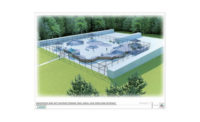Denver's upscale Cherry Creek North neighborhood is experiencing its biggest construction boom since the 1980s, with more than $500 million in commercial and residential projects going up, recently completed or planned. Demand from businesses and residents is driving the development.
But the growth has changed the historical profile of the neighborhood, bringing with it taller buildings and increased density. The city and county of Denver passed new form-based zoning for Cherry Creek North this fall that didn't affect current construction projects but will figure into future development.
The new code aims to encourage a greater mix of land use in the district and to better connect Cherry Creek to the rest of the city, including through more mass transit. Specific goals of the code include maintaining Cherry Creek North's unique character with strategies such as open space allowances and a 5-ft street setback. It also encourages reinvestment in small lots by reducing parking requirements, among other incentives.
The code calls for staggered building heights, with the tallest buildings (12 stories, or 150 ft, maximum) allowed only in the business core, in order to create a transition from business to residential space.
"The new zoning code gets us back to more people living here," says Julie Underdahl, president and CEO of the Cherry Creek North Business Improvement District, a quasi-municipality that provides services to enhance the area's business environment.
New projects include Denver-based Western Development Group LLC's nearly 400,000-sq-ft, $100-million 250 Columbine office, residential and retail complex and local green developer Zocalo Community Development Inc.'s 185-unit Coda Cherry Creek apartment property, expected to be LEED certified.
A 150-room, $60-million boutique hotel is being built at 245 Columbine St., developed by Denver's BMC Investments Co. LLC and Sage Hospitality Resources LLC. BMC also is developing the 218-unit, $92-million Steele Creek apartments.
At 12 stories each, Coda Cherry Creek and Steele Creek are the tallest buildings under way. They are located across the street from each other. To build that high under the district's old zoning code, which prohibited buildings taller than 55 ft, developers had to use zoning allowances from other areas of the city—so-called one-off zoning—approved by the Denver City Council.
"The old Cherry Creek North zoning was broken," says Kyle Dalton, associate city planner for the Denver Community Planning & Development Dept. and co-project lead for Cherry Creek North's new zoning. "It had been in place for 25 years and was limiting the quality zoning that people were looking for."
Located just three miles southeast of downtown, Cherry Creek is known as an outdoor retail district with 16 blocks of mostly high-end, independent stores that attract customers from across the state. The area was previously the town of Harman, founded in the late 1800s, and some of its buildings, including the old town hall, still exist.
But Cherry Creek North also includes office buildings. Some of that space has become its own small financial district, hosting banks as well as investment advisory companies like Charles Schwab & Co. The business district sits across East 1st Avenue from the 1.1-million-sq-ft Cherry Creek Shopping Center, a regional mall that features such high-end retailers as Tiffany & Co. and Neiman Marcus.
Residential, Multi-Use Boom
Some of the most significant of the area's multiple projects are pricey residential units—mostly for-rent apartments.
"The Cherry Creek North area is getting more residential," says Underdahl. "Before the current development, we had only 50 residential units in the district."
The 250 Columbine development's 72 condos are the only for-sale residences currently under construction in the neighborhood, partly because Colorado's tight construction-defect laws make the potential liability and higher costs, including insurance, of building condos too risky for many developers.
Many of 250 Columbine's luxury units—with features such as folding glass walls and gourmet kitchens—are already under contract, according to the project website. Those still unsold range from roughly $450,000 for a one bedroom to $2 million for a penthouse.






